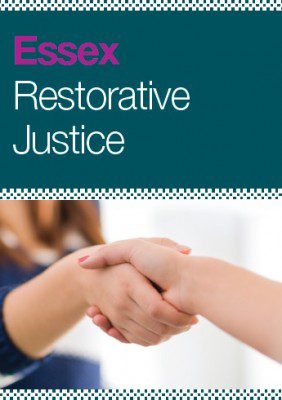 Successful Trial of Restorative Justice Completed
Successful Trial of Restorative Justice Completed
Essex Police have successfully completed a six-months trial in West Essex, which includes the districts of Epping, Brentwood, Harlow and Thurrock. It is now intended to roll it out to the rest of Essex from October and the Police & Crime Commissioner is inviting those groups and agencies who might be interested in getting involved to attend one of two launch events:
- 27th October 12.00 – 15.00 at The Rayleigh Club, Hullbridge Road, Rayleigh, SS6 9QS ,
- 28th October 12.00 – 15.00 at The Essex Golf and Country Club, Colchester, CO6 2JU.
The afternoon will begin with a buffet lunch, followed by talks and presentations focusing on the success of the West Essex RJ pilot, the impact of restorative justice on those that take part, and what the roll-out means for you in your organisation. The launch will involve speeches from PCC Nick Alston, members of the RJ Hub and examples from those who have participated in Restorative Justice in Essex.
If you are interested in attending please contact Emma Callaghan, Restorative Justice Hub Development Manager, by email [antibot mailto=”[email protected]”], before Friday 16th October.
So, What is Restorative Justice About?
Restorative Justice is a process which gives victims the opportunity to meet or communicate with those who have offended against them. It holds offenders to account and helps them take responsibility for the harm they have caused. Both parties discuss next steps and the offender can then make amends.
Victims are given the chance to explain to a criminal the impact a crime has had on them, ask questions of the offender and seek an apology. It enables offenders to be held to account for what they have done but also take responsibility for the harm they have caused. If a face-to-face meeting is not appropriate they can do so indirectly via letters or messages.
Restorative justice is used for less serious offences or conflicts, such as graffiti or anti-social behaviour. Everyone involved must consent to take part.
The Benefits are Apparent
- 85% victims are satisfied following an RJ process.
- Re-offending is reduced by as much as 27%.
- 98% direct RJ ends in mutually agreed outcomes.
- RJ decreases post-traumatic stress and allows victims of crime to return to work more quickly.
- In neighbour disputes, RJ can help to avoid evictions and help neighbours live in peace.
Read more on the Police & Crime Commissioner’s website or download their information leaflet.


